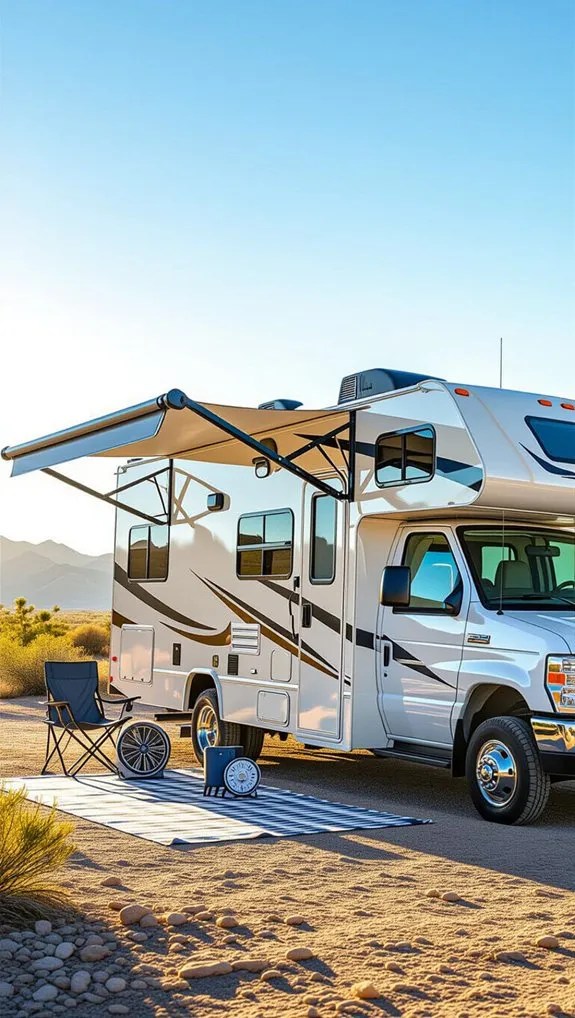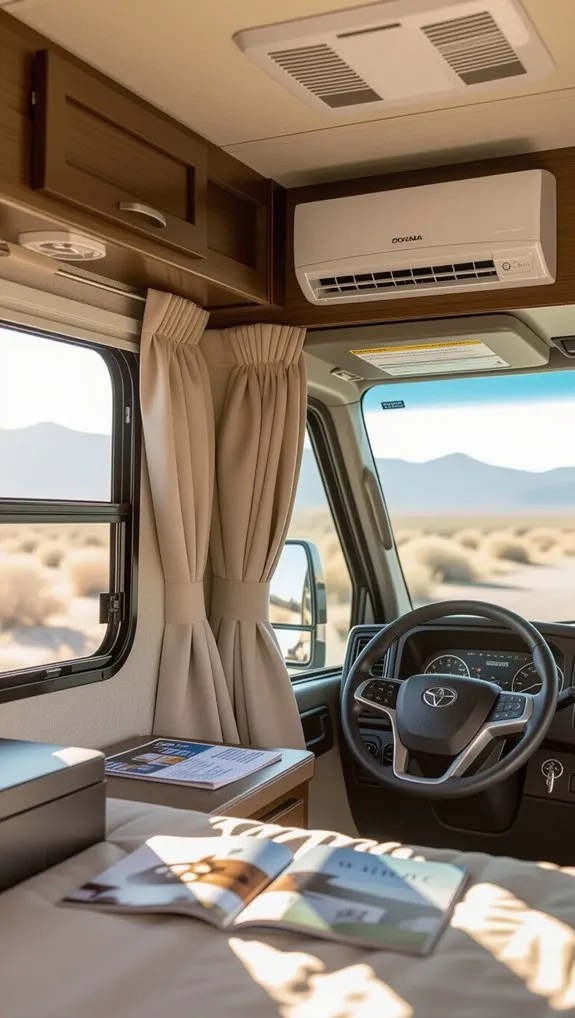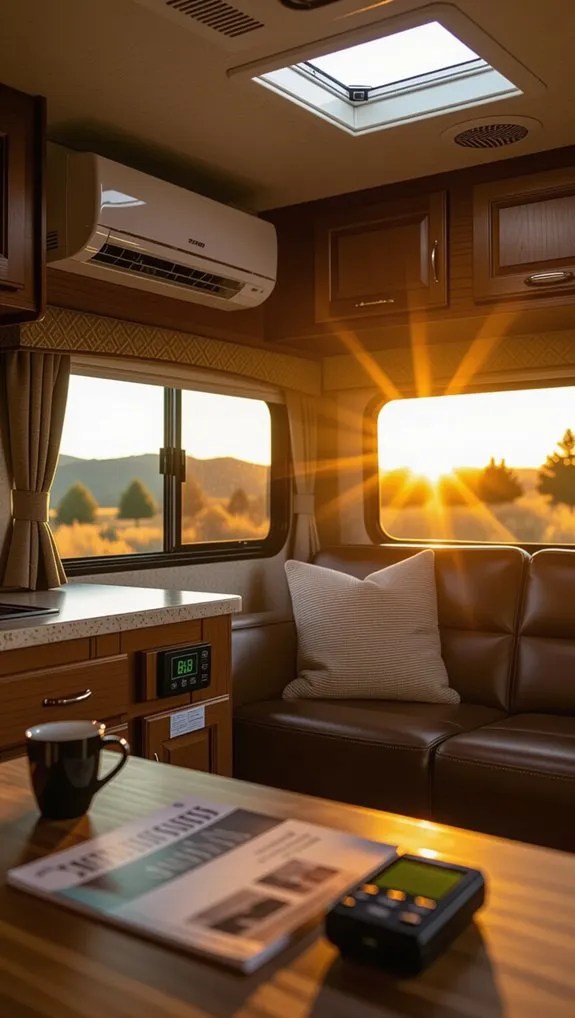Is it OK for RV AC to run all day? This is one of the most common questions RV owners ask, especially during those scorching summer road trips. The short answer is yes, but there’s definitely a right way and a wrong way to do it.
Running your RV air conditioner continuously isn’t just about staying comfortable—it’s about understanding your system’s capabilities and your power limitations. Modern RV AC units are built to handle extended operation, but doing it smartly can save you money, prevent breakdowns, and keep you cool all season long.
In this post, we’ll dive into the practical side of running your RV AC all day, including power consumption tips, maintenance strategies, and how to maximize cooling efficiency without putting unnecessary strain on your electrical system or your wallet.
Is RV AC OK running all day

Generally, running your RV’s air conditioner all day is perfectly fine and won’t harm your cooling system. As a matter of fact, continuous operation can be less stressful than frequent on/off cycling, which causes high amperage startup surges.
Make sure to keep your filters clean and maintain good airflow to prevent potential issues. Modern RV AC compressors and fan motors are designed for all-day use, so you can enjoy consistent cooling without worrying about system strain.
Just remember to monitor your unit’s performance and keep the area around your AC clean and unobstructed for optimal efficiency.
Will running RV AC damage anything
While many RV owners worry about potential damage from running their AC continuously, you’ll be relieved to know that modern RV air conditioning systems are actually designed to handle all-day operation without significant risk.
The first thing to understand is that continuous running can expose underlying issues like dirty filters or poor airflow. Keeping your system clean and well-maintained prevents potential damage.
Low fan speeds and direct sunlight can stress the system, so ensure proper ventilation and shade. By monitoring your AC’s performance and addressing any maintenance needs, you’ll keep your RV cool without risking component wear.
Does running AC all day waste power

Most RV owners will inevitably wonder whether running their air conditioning system all day wastes power, and the answer isn’t as straightforward as you might think.
Running AC continuously can actually be more energy-efficient due to reduced startup current spikes. Consider these factors:
- Continuous operation reduces high-amp startup energy
- Proper maintenance prevents unnecessary power consumption
- Temperature settings impact overall energy use
- Ambient conditions significantly affect AC efficiency
Your AC’s power consumption depends on multiple variables like airflow, filter cleanliness, and external temperature.
Strategic cooling approaches can help manage energy expenditure while keeping your RV comfortably cool.
Best thermostat settings for long runtimes
After grasping how continuous AC operation impacts energy consumption, pinpointing the optimal thermostat settings becomes your next strategic move for efficient RV cooling. Aim for a moderate 72–75°F setting to balance comfort and system stress.
Use a programmable thermostat with Auto fan and a 3–5°F differential to reduce compressor cycling. In high-heat conditions, avoid extremely low setpoints that strain your system.
When running AC all day, monitor amp draw and set the thermostat to encourage longer, fewer compressor cycles. This approach minimizes startup wear and maintains steady, efficient cooling throughout your journey.
Can my power source handle all-day AC

Invariably, your RV’s power source becomes the critical bottleneck when running air conditioning all day. Knowing your power limits prevents frustrating breakdowns and electrical mishaps. Consider these key power management strategies:
- Verify shore power amperage (30A vs. 50A)
- Monitor generator capacity for continuous AC
- Calculate total electrical load before running multiple appliances
- Use surge protectors to prevent unexpected power interruptions
A 30A shore power connection might struggle with all-day AC, potentially tripping breakers or causing voltage drops. For reliable cooling, upgrade to 50A service or carefully manage your electrical consumption to keep your RV comfortable and safe.
How to run RV AC safely all-day
Running your RV’s AC all day requires smart setup and careful monitoring to ensure reliable cooling and prevent potential issues.
I’ll walk you through critical steps like optimizing your thermostat settings, conducting power capacity checks, and maintaining clean air filters to keep your cooling system running smoothly.
These proactive measures will help you maintain a comfortable temperature while protecting your RV’s electrical system and air conditioning equipment.
Thermostat setup
When you’re looking to keep your RV comfortably cool all day, smart thermostat setup becomes your secret weapon for efficient and reliable air conditioning.
Here’s how to dial in your cooling strategy:
- Set the fan to ON for constant air circulation
- Use a programmable thermostat with compressor lockout
- Position the sensor away from direct heat sources
- Maintain a reasonable cooling differential
Power checks
After fine-tuning your thermostat settings, powering your RV’s air conditioning system safely becomes the next critical consideration.
Check your campground pedestal or generator’s capacity to handle your AC’s startup and running amps.
Use a soft start device to reduce compressor surge by up to 70%.
Run the AC on a dedicated 30 or 50 A circuit with quality shore power cords to prevent voltage drop.
Monitor battery state-of-charge when using generator or inverter power.
Maintain proper airflow and ensure the condenser gets some shade for optimal efficiency and reduced power consumption.
Filter cleaning
Consistently maintaining your RV’s air conditioning filter is the key to running your cooling system safely and efficiently all day long.
Proper filter care prevents potential issues and ensures optimal performance.
4 essential filter maintenance tips:
- Clean or replace every 1-2 weeks during heavy use
- Use washable foam or pleated filters rated MERV 6-8
- Allow washable filters to fully dry before reinstalling
- Inspect and vacuum filter housing quarterly
Neglecting filter maintenance can increase static pressure, reduce cooling efficiency, and potentially cause long-term system damage.
Stay proactive to keep your RV cool and comfortable during extended cooling periods.
Prevent AC freeze-ups in extreme heat
Frequently, RV owners face the frustrating challenge of AC freeze-ups during scorching summer days, turning what should be a cool retreat into an uncomfortably warm mobile living space. To prevent this, I recommend running the AC fan on high when the compressor’s on, which reduces moisture buildup and freezing risks.
Keep filters clean and ducting unobstructed to maintain proper airflow. In extreme heat, use short compressor off-cycles or continuous fan mode to prevent coil saturation.
If you spot frost on the evaporator coil, raise the thermostat and switch to fan-only to allow thawing, ensuring a consistently cool RV experience.
Reduce heat load to cool better

In the sweltering summer heat, your RV’s cooling system can quickly become overwhelmed without strategic heat management.
To reduce the cooling load and give your AC a break, I recommend:
- Park in shaded areas or use reflective covers to block solar heat gain
- Close blinds and use vent covers to minimize radiant heat transfer
- Cook outside to prevent internal heat generation
- Utilize fans to improve air circulation and set AC higher
Warning signs to shut it off
When your RV’s air conditioning system starts sending distress signals, it’s crucial to know the warning signs that demand immediate attention. Icing on the evaporator coil, a tripped breaker, or unusually high motor amperage are red flags to shut down your AC.
Listen for grinding, screeching, or clunking noises, and watch for burning smells—these signal potential safety issues. Poor airflow, frequent short cycling, or inconsistent cooling can indicate deeper problems that’ll damage your system if ignored.
Don’t risk costly repairs; power down and investigate when these warnings appear.
What to do in power brownouts

Power brownouts can turn a comfortable RV journey into a stressful experience, especially when your air conditioning system is at risk. Protect your AC and maintain comfort by grasping how to handle low-voltage situations:
- Use a voltage monitor to track power fluctuations
- Switch to fan-only mode during sustained brownouts
- Avoid repeatedly restarting the AC compressor
- Consider a surge protector with under-voltage protection
When shore power drops below safe thresholds, prioritize your AC’s health. If possible, switch to generator power or reduce concurrent electrical loads to prevent compressor damage and ensure a cool, stress-free RV experience.
Frequently Asked Questions
Can You Leave an RV Air Conditioner on All the Time?
I can leave my RV AC running all day if I keep filters clean, maintain good airflow, and monitor power limits. It’s fine when done properly, but I’ll be careful to prevent system strain or overheating.
What Is the $5000 AC Rule?
I’ve learned the $5000 AC rule suggests continuously running an expensive air conditioner to reduce high-amperage start cycles, which can cause more wear than sustained operation, potentially extending the unit’s lifespan and preventing premature replacement.
Is It Bad for AC to Run Continuously?
For RV ACs, continuous running isn’t bad. In fact, it’s often less stressful than frequent cycling. I’d recommend maintaining clean filters, ensuring good airflow, and monitoring your unit’s performance to prevent potential issues.
How Long Can RV AC Run?
I can run my RV AC continuously for days without issues, provided I maintain good airflow, keep filters clean, and ensure proper ventilation. Regular maintenance and monitoring prevent potential system strain during extended operation.
In Conclusion
Running your RV AC all day is absolutely manageable when you follow proper maintenance and monitoring practices. The key lies in being proactive—maintaining clean filters, using surge protection, setting reasonable temperatures, and staying alert to warning signs like unusual noises or voltage fluctuations. Your AC system is designed to handle extended operation, but smart usage habits will ensure it serves you reliably for years to come.
While keeping your RV cool is essential for comfort, don’t forget that other appliances also play a crucial role in your road trip experience. If you’re looking to upgrade your RV setup with efficient, reliable appliances that won’t overburden your electrical system, check out our rv refrigerator reviews to explore smart, well-reviewed options that complement your cooling strategy perfectly.

